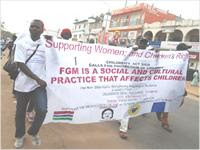 |
| GAMCOTRAP Officials: Pix-Gamcotrap |
A
local human rights agency in Banjul, the Gambia Committee on Traditional Practices Affecting the Health of
Women and Children (GAMCOTRAP) has called on the
government to enact a specific law to protect girls from Female Genital
Mutilation (FGM).
The
call came on Tuesday February 6, 2012 during celebrations marking International
Zero Tolerance to FGM, a day adopted in August 2003 by governments, and
organisations, including the United Nations sub-Commission on the Promotion and
Protection Human Rights.
On
Monday, GAMCOTRAP said it wants a legislation banning FGM across the Gambia, a
country notorious for its deep-rooted culture and harmful traditional
practices. Hence the lack of it will apparently contribute to the perception of
FGM as “acceptable” and it weakens the legitimacy and impact of advocacy
against harmful tradition practices.
Human rights violation
FGM
is a violation of the human rights principles of International Law including
the Convention on the Rights of the Child (CRC), the Convention on the
Elimination of All Forms of Discrimination Against Women (CEDAW), the Protocol
to the African Charter on Human and People’s Rights on the Rights of Women in Africa,
and the African Union Solemn Declaration on Gender Equality in Africa.
Speaking
at the celebrations organised by GAMCOTRAP with funding from the European Union
under the Non-State Actors Strengthening Programme (NSASP), Dr. Isatou Touray,
the Executive Director of GAMCOTRAP said “Effective national legislation is a
vital component of efforts to accelerate the elimination of FGM”.
“The
enactment and implementation of legislation against FGM demonstrates a formal,
explicit and lasting commitment by public authorities to turning the tide of
social norms that perpetuate the practice and are detrimental to the physical,
psychological and rights to integrity of women and girls,” she said.
The Government of The Gambia (GoTG) has
ratified almost all international and regional instruments regarding women and
children’s rights. This, Dr. Touray said is a sign of “political will and
interest to advance the strategic interest and human rights of women and
girls”.
However,
there remains a daunting task to clean the country of FGM as latest statistics
shows 78 per cent of the female population still practices it, showing just a
marginal improvement of 80 per cent in 1999.
Religious misconceptions
FGM
has survived for long due to religious misconceptions, and that the patriarchal
system has succeeded in attributing a negative image of the female body to such
a “degree that women themselves have internalized the value of
self-devalorisation”.
Speaking
on behalf of the United Nations Family Planning Agency (UNFPA), Mrs. Fatou
Kinteh noted that the most common form of FGM practice in the Gambia is known
as clitoridectomy or excision (the total removal of the clitoris, with or
without partial or total removal of the labia minora).
“Some
ethic groups in The Gambia practice FGM for religious reason and some Islamic
religious leaders and scholars also promote it for religious reason,” she
argues. “What is clear is that some Muslims do not perform it, and then it
can be concluded it is not religious obligation but a deep-rooted traditional
belief and practice.”
The
practice has serious immediate and long term health effects and is a violation
of fundamental human rights, Mrs. Kinteh reiterated, saying “the health
challenges are enormous as 1000 women die daily on a global level, from
complications (including circumcision) associated with pregnancy and childbirth”.
Jammeh must speak
Until
men become aware of the mental and psychological health effects of FGM, then
they will fully participate or stand against it, the United States Ambassador
to Banjul, Pamela Ann White said in her keynote address.
“My
message to President Jammeh is that we need your voice against FGM,” she said
to the Gambian leader, who in 2009 openly stated that “I do not support FGM”.
 |
| Procession against Female Genital Mutilation, Pix - The Daily News |
Marked
by a two-kilometer procession, the event was graced by more than 70
participants, mainly women and from across the Gambia, with cultural interludes
on the harmful traditional practice of Female Genital Mutilation.
Author: Modou S. Joof
Twitter (@Msjoof)
You have really covered the event very well and professionally too, I must add. Let us hope that as we continue to celebrate the day more girls will be protected by law and adults will continue to take responsibility to protect them.
ReplyDelete